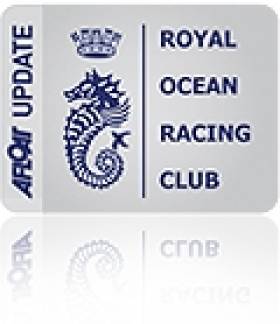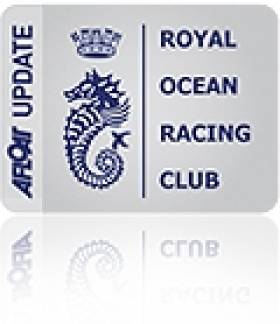Displaying items by tag: ICAP
Rambler Breaks Caribbean 600 Record
George David's maxi yacht, Rambler 100 crossed the finish line in Antigua in the early hours of Wednesday morning in an elapsed time of 1 day 16 hours 20 minutes and 2 seconds.
Rambler 100 has broken the monohull race record set by race rival, Mike Slade's ICAP Leopard by nearly four hours.
Two of the world's most impressive racing yachts have been locking horns over 600 miles of high-speed action in a fight to the finish. Competing against each other for the first time and battling it out to snatch the record for the third edition of the RORC Caribbean 600.
32 other yachts from 15 different nations crossed the start line of the RORC Caribbean 600, off English Harbour in Antigua, Caribbean on February 21st. Most of the fleet is expected to finish over the next 24 hours.
Latest news on the race website: http://caribbean600.rorc.org/
Follow the fleet trackers online: http://caribbean600.rorc.org/race-information/tracking/2011-fleet-tracking.html
Carrickfergus Navigator Ian Moore Plots Aegir Caribbean Course
On loan from the Oracle America's Cup Team, Northern Ireland ace navigator Ian Moore is the navigator on board the Carbon built 80-footer Aegir for this week's RORC race in the Caribbbean.
Antigua Yacht Club is buzzing with excitement, with two days to go to the start of the 600-mile race around the central Caribbean. Yacht crews are busy at work making final preparations for the Royal Ocean Racing Club's (RORC) Caribbean 600. Falmouth Harbour is an impressive sight with the RORC fleet safely moored up next to the yacht club.
RORC Yacht of the Year ready for battle
Piet Vroon's Ker 46, Tonnerre de Breskens - the RORC 2010 Yacht of the Year - arrived just before dusk on Friday. The delivery crew, all six of whom will also be racing, endured a 1,000 mile beat to Antigua from Jamaica: "This will be our fourth and final event in the Caribbean." Explained Piet Vroon. "This is the first time that I have done this race and it is the main reason that we came to the Caribbean. All of my crew said that this is a race that they want to do and I am very much looking forward to it."
Tonnerre is one of three boats that competed in the Pineapple Cup, the opening rubber of the Atlantic Ocean Racing Series. George David's Rambler 100, Richard Oland's Vela Veloce and Hugo Steinback's Dubois 90, Genuine Risk also competed in the Pineapple Cup which Genuine Risk won on corrected time. Vela Veloce is a Southern Wind 52, which cleaned up in Key West race week in January.
Entries from Australia and 14 other nations
Yachts representing 15 Nations have come to Antigua to compete in the 600-mile spectacular, but none have come as far as Chris Bull's Cookson 50, Jazz. The canting-keel flyer arrived in Antigua on Friday, having made an epic journey bycontainer ship and sail from Australia, after a fantastic performance in the Rolex Sydney Hobart.
"It's been hard work getting the boat here from Australia, but we have done it, which just goes to show it is possible." Commented Boat Captain, Anthony Haines. Jazz's journey started on January 8th from Sydney, Australia to Savannah, Georgia. After which the delivery crew sailed 1400 miles to get Jazz to Antigua on time.
"Ever since the RORC conceived the idea of this race I have wanted to do it," said Chris Bull on he dock in Antigua. "I am also keen to do the Transatlantic Race and try and win the Atlantic Ocean Racing Series which I think is an excellent initiative which the RORC are involved with."
Rock Stars and Corinthian Sailors Rub Shoulders
From Lithuania, the Volvo 60, Ambersail debuts in the Caribbean and counts veteran round the world sailor Magnus Olsen in their crew. Ambersail is well travelled, having competed in last year's Sevenstar Round Britain and Ireland Race and the Rolex Middle Sea Race.
Ondeck's Farr 65, Spirit of Minerva counts British solo-sailor Hannah White amongst the crew: "Effectively there are 10 legs and well over 600 miles of racing in fantastic trade wind conditions which I am sure will be a strong test for navigators and crews in equal measure." Commented Hannah.
Class 40 World Champions on the line
Six Class 40s are expected, possibly more. Tony Lawson's Concise and Gonzalo Botin are past and current Class 40, world champions. Tony Lawson, owner of Concise expects a close duel with Tales: "There is no doubt that the Spanish team will be fast and possibly more suited to lighter conditions, but I am confident that the team on Concise will be fully focused and they are in control of a quick, well prepared boat."
Power and Elegance Combine
RORC Commodore, Andrew McIrvine has chartered the elegant and powerful 154 ft schooner, Windrose of Amsterdam. The crew has taken the magnificent yacht through its paces, spending two days practicing manoeuvres: "It is a very different kind of sailing to my First 40." Commented Andrew McIrvine. "The sheer size of the sails and equipment make for extremely physical work and manoeuvres are far more complex. Communication from front to back is only possible by hand signals. We had some good pressure during our practice session, which confirmed that Windrose is a powerful yacht, literally built for Caribbean sailing."
Navigator's make their Predictions
Brian Benjamin's Carbon Ocean 82, Aegir has been out testing sails and the crew, visiting the top part of the race course all night Friday. Night sailing makes up close to half the time during the race. Boat captain Shreda Duke confirmed that the exercise was very successful in bedding in the crew to their proposed watch-system. Aegir's navigator for the race is Ian Moore on loan from the Oracle America's Cup Team. Moore concurs with Hugh Agnew, ICAP Leopard's navigator, the prediction of stable trade wind sailing but added: "The first key area of the race may well come as night falls. Aegir should be approaching Nevis at dusk and the first really tricky part of the course. The islands of Nevis and St Kitts are high, which will throw out quite a wind shadow through this area; there will be a lot of gear changes in between the lulls and puffs of acceleration. The big decision from a navigator's point of view will be how far off the leeward side of these islands to go."
In Falmouth Harbour, the air temperature is a balmy 27º C and a fair breeze is flowing in from the northeast, meaning that the trade winds are functioning, but it's an ever-changing picture. Read John Burnie's expert summary on the RORC Caribbean 600 web site: http://caribbean600.rorc.org/
100 footers Go Head to Head
ICAP Leopard set the monohull course record in 2009, completing the course in 44 hr 5 min 14 sec and Mike Slade's team believe that they could beat the record, although they may not be the first home. George David's stunning Maxi, Rambler 100 is dockside in Falmouth and are favourites to take line honours. George David has secured the assistance of Ken Read to the afterguard and some of Ken's Puma Volvo Ocean Race crew. It is the first time that these two 100 foot canting keel maxi's have raced each other with ICAP Leopard having taken an interesting strategy and dropped their rating considerably, in a bid to gain handicap honours.
Local Knowledge from Caribbean Entries
Local interest comes from Bernie Evan-Wong who is competing in the race for the third time in his Mumm 36, High Tension. From Guadeloupe there is a Class 40, Territoires Attitudes, skippered by David Ducosson.
34 boats are expected on the start line on February 21st February. The RORC Caribbean 600 web site contains regular updates on the race, blogs from the boats and the progress of the boats, which have trackers, can be followed via the website: http://caribbean600.rorc.org/

























































